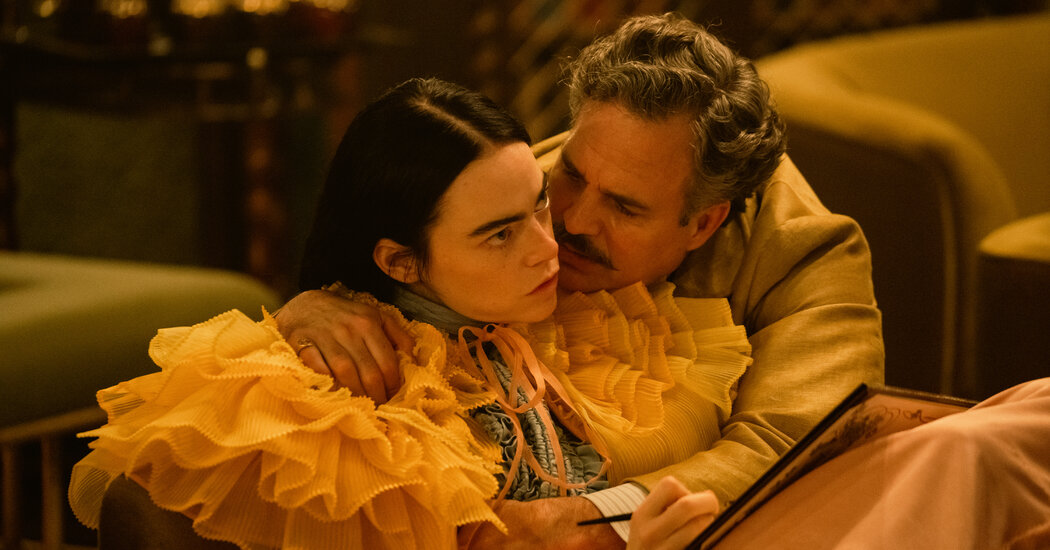
Written by Tony McNamara and adapted from the 1992 Alasdair Gray novel of the same title, “Poor Things” gets its weird on from the get-go. Working in a flamboyantly expressive key, Lanthimos deploys all the elements at his disposal — prosthetics, costumes, meticulous production design and pushily showboating cinematography — to create a familiar yet alien world of calculated dissonance. Baxter, for one, is a crazy quilt of horror, much like Frankenstein’s monster. The child of a scientific madman who experimented on him, he has a face that looks like it was chopped into ragged pieces and then stitched back together by a nearsighted tailor. The parts don’t fit, but they don’t fit with exacting precision.
Bella does grow and her fortunes also change courtesy of two suitors: the earnest and toadying McCandless, whom Baxter hires to document her development, and an oily, smooth-talking huckster with nimble fingers, Duncan Wedderburn (Mark Ruffalo). After Duncan tickles her fancy (and other parts), Bella sets off with him across land and sea in an episodic adventure that expands her horizons and revs up the story in earnest. She learns about the world’s pleasures and cruelties, and in classic Bildungsroman fashion develops intellectually and morally (kind of). She converses in complete sentences, reads Emerson and meets a mischievous dowager (Hanna Schygulla) and her jaded companion (Jerrod Carmichael).
Like the monster in Mary Shelley’s novel, the movie is a patchwork. In its overall arc it evokes an old-school picaresque; the chapter titles and an interlude in a brothel summon up “Breaking the Waves,” one of Lars von Trier’s movies about a woman enduring a crucible of suffering. Bella scarcely suffers, which is a relief, as is her unladylike gusto and delight in sex. Her pleasure in her own liberation sustains your interest even as all the fussing and strained eccentricity wears on you. “Poor Things” is about the humanation of a monster, yet because Lanthimos isn’t interested in less obvious, blander human qualities like gentleness, the movie grows progressively monotonal, flat and dull. Its design is rich, its ideas thin.
Ruffalo’s and Dafoe’s performances are precise and refined, even during their characters’ more overstated moments, and each creates deeper, more interiorized men than the dialogue suggests. Ruffalo exposes Duncan’s vanity before the character does, while Dafoe brings to life Baxter’s bifurcated personality, his decency and his sadism, with haunted eyes and brisk, no-nonsense equanimity. Together, the two actors work beautifully with Stone, who builds her performance so discreetly — with words, gestures and footfalls that stagger and halt only to then seamlessly flow together — that it can seem as if all the changes Bella experiences were emanating from deep within the character, not the actor.
Scene by scene, polished detail by detail, “Poor Things” throws a great deal out for you to gawk at, guffaw over and slightly recoil from before you’re prompted to giggle again: a steam-engine carriage with a horse’s head, the biomorphic swirls on a ceiling, the bruising colors of a night sky, a feathered dog. For the most part, these particulars are often comic and eye-catching, having been built for maximum wow. Yet as the story stalls out and all the showy minutiae, the viscera and icky yuks just keep on coming, the cumulative effect becomes bludgeoning. It isn’t long into “Poor Things” that you start to feel as if you were being bullied into admiring a movie that’s so deeply self-satisfied there really isn’t room for the two of you.
Poor Things
Rated R for nudity, sex, evisceration and scientific malfeasance. Running time: 2 hours 21 minutes. In theaters.













